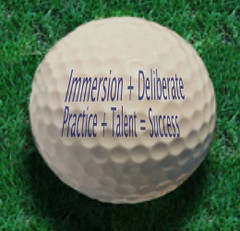I really enjoy reading Bill Kerr's blog because there are always challenging ideas and concepts on the boil. He readily admits that he doesn't take a whole lot of notice of the education blogging world so he explores topics that most of us tend to skim over. When I read his work though, it is imposssible to skim. It will often take several careful reads to clearly work through the layers of thought especially if I'm meaning to comment or reflect on his ideas. I was taken by his latest post, immersion plus, which revisits a previous post of his from July and also ties in some of Tony Forster's viewpoint. Bill establishes why immersion alone for learning isn't enough:
I just said, immersion works. But immersion doesn't always work. I've spent time working in factories and knew workers there who had lived in Australia for 20 years and who still spoke poor English. I've seen chess players who play far more regularly than I do and yet their game does not improve much. In both cases the people involved did not participate in effortful study, they did not grasp the importance of deliberate practice in acquiring expertise. Just putting in more hours (immersion) is not the same as effortful study with clear goals to improve ones understanding.
I like to think I got a handle on all of this Web 2.0 stuff via the process of immersion. Evening after evening, ignoring the banality of television, poking around on the laptop have given me skills and knowledge beyond the grasp of my staffroom colleagues. But could this occur to any teacher? Or is another essential ingredient needed for immersion to pay off?
Back in July, Artichoke used a New Scientist quote about golfer Tiger Woods to comment on the idea of deliberate practice. I would also add that this particular person's success is a combination of immersion (as an infant, Woods would watch his father hit golf balls into a practice net in the garage from his high chair), deliberate practice and innate talent.
I've been itching to pull a golf analogy into technology and education for a while and Bill has given me that excuse. The interesting thing about golf compared to other sports is the way ability or talent is measured - the use of the handicap system. Based on a person's scores, a handicap is calculated with the lower the figure, the better the golfer. I am an average but very keen golfer - 17 handicap - and before the kids came along, I used to spend several hours each week practising. Whether my style of doing things could be accurately categorised as deliberate practice is another argument but my handicap did dip to an all time best of 13 back in 1998 when I was playing every Saturday, playing nine holes after work on Thursdays and bashing balls on the practice fairway or chipping green on Mondays. My improvement could be directly related to my practice.
What would happen if I was to be immersed in the game of golf? If I didn't have the distractions and responsibilities of work? How good could I become?
A few years ago, Golf Australia did an experiment that trialled the golf immersion idea. They grabbed an average golfer - 20 handicap - and paid for him to have a year off to work on his golf game. They gave him customised equipment, provided scaffolded learning with the use of a golf coaching professional and required him to play a minimum of three times a week and to practice every work day. Over the course of a year, he did improve - he got to a handicap of 9, if I remember correctly - but it didn't look like going further than that. I think that his limitations in his ability would put a ceiling on his improvement, regardless of the immersion. Tiger Woods, possibly the most talented golfer ever, had all three factors for his success - immersion, deliberate practice and talent.
 I think in the business of learning, talent (or lack of) is often overlooked as an important factor. Immersion and deliberate practice can maximise that talent, however. I hope that my simplistic analogy is a useful adjunct to your thoughts, Bill. Keep 'em coming.
I think in the business of learning, talent (or lack of) is often overlooked as an important factor. Immersion and deliberate practice can maximise that talent, however. I hope that my simplistic analogy is a useful adjunct to your thoughts, Bill. Keep 'em coming.
